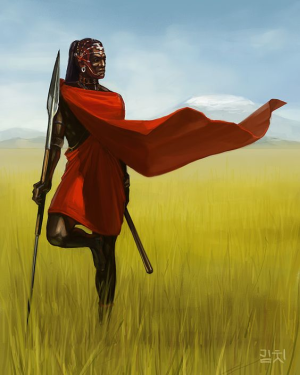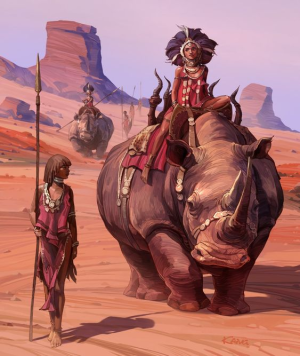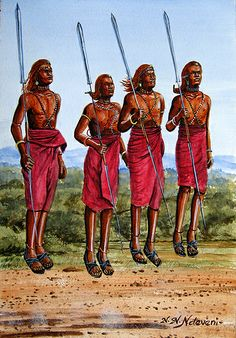OUT-OF-CHARACTER INFORMATION
Name: Huru
Type: Race
Credits: Picture 1 / Picture 2 / Picture 3
Consolidation Thread: N/A
Intent: To create a sub-race of humans that live in the desert, for future usage
Description: The Huru are a race of humans that live in the deserts and savannas of the southern continent. These people are very spiritual and nature-oriented. They want little to do with the outside world and as such, many don't involve themselves in the wars of others and stick to their own.
GENERAL INFORMATION
In the distant past, the Huru were a nomadic people who traversed the vast savannahs and deserts of their homeland. They were guided by their reverence for their Gods, deities they believed provided for their needs and watched over their tribe. This kept them wondering about the endless deserts for hundreds of years, slowly turning from human outsiders to veteran survivors of these lands.
As their society evolved, the Huru faced challenges from rival tribes and external forces seeking to exploit their land and resources. the Huru fought fiercely to defend their way of life and maintain their independence. These struggles lasted many generations of Huru fathers and mothers, eventually leaving these people almost broken and extinct.
Over time, the Huru developed intricate survival strategies adapted to their harsh environment, reminiscent of the local desert fauna whose expertise gave them a survival chance in the desert. They perfected techniques for water conservation, mastered the art of animal husbandry, and honed their combat skills to protect their territory from invaders.
The Huru's history was marked by periods of conflict and cooperation with neighbouring tribes and civilizations, echoing the political complexities of The southern continent. They formed alliances with sympathetic groups and engaged in trade to secure essential resources while remaining vigilant against those who sought to exploit or subjugate them.
Despite the challenges they faced, the Huru remained steadfast in their commitment to their cultural traditions and spiritual beliefs. Through rituals and ceremonies honouring their Gods and the land, they reinforced their sense of identity and unity as a people, drawing strength from their collective heritage.
Name: Huru
Type: Race
Credits: Picture 1 / Picture 2 / Picture 3
Consolidation Thread: N/A
Intent: To create a sub-race of humans that live in the desert, for future usage
Description: The Huru are a race of humans that live in the deserts and savannas of the southern continent. These people are very spiritual and nature-oriented. They want little to do with the outside world and as such, many don't involve themselves in the wars of others and stick to their own.
GENERAL INFORMATION
- Name: Huru
- Designation: Human race
- Countries: Savarna, Shenghanna
- Provinces: N/A
- POIs: N/A
- Average Lifespan: 50-60 years
- Estimated Population: Unkown
- Average Height of Adults: 6 feet
- Average Length of Adults: N/A
- Skin colour: Light Brown to Black
- Hair color: Black
- Distinctions: Tall and slender stature, distinct red clothing, and blue eyes. Intricate beadwork, and jewellery when outside of their homes they often cover their faces to stay anonymous to outsiders and for protection against the sands of the harsh deserts. Can at times be seen looking over their land while standing on one leg like a flamingo.
- One with Nature - Having to endure the dangers of the desert for generations has forced the Huru to adapt and become one with the desert, making them expert navigators of the terrain, and even more fierce hunters.
- Loyal - They stay strong to their own and to those they trust, as that is the way of the Huru, and the way they were brought up. It is hard to earn for outsiders but will last a lifetime.
- Technologicaly behind - Living in the desert and having a general lack of interest in science plus their aptitude for nature has left the Huru behind in the race for new technology.
- Traditions - Their beliefs make these people very narrow-minded individuals who don't always seek the most fortunate path but, what is tradition for their people.
- Diet: Primarily pastoralists, relying on a diet of milk, blood, and meat from cattle, supplemented with grains and vegetables. The Huru eat whatever the land provides for them.
- Communication: Oral tradition passed down through storytelling, songs, and rituals; also modern forms of communication.
- Technology level: Primitive levels, extending mostly to their usage of spears bows, and animal-drawn carriages for the transport of materials. Their houses are often carved out of the massive mountains in the outer rims of the desert, or made out of the skin of animals hunted in the form of tents.
- Religion/Beliefs: Rituals and ceremonies play a crucial role in this religion. These rituals serve as expressions of devotion to their mysterious Gods and the natural world, emphasizing the interconnectedness of all living beings. Through ceremonies marking significant milestones such as warriorhood and marriage, the Huru reaffirm their cultural identity and strengthen their bonds as a community.
Central to this religion is a deep reverence for the land, its resources and the Huru's respect for the harsh environment. The Huru view the natural world as sacred, understanding the importance of living in harmony with it to ensure their survival and prosperity. They engage in practices that honour the Earth and its ecosystems, recognizing their role as stewards of the land entrusted to them by the Gods.
In essence, the religion of the Huru is a synthesis of traditional spirituality and the survivalist ethos of the desert folk. It encompasses a profound reverence for their Gods as the divine force that permeates all existence, intertwined with a deep respect for nature and the cultural traditions that sustain their way of life. - General behaviour: Strong emphasis on communal living, patriarchal society with age-grade systems and rites of passage. The Huru value honesty and honour highly in their society. Their almost complete lack of infighting can see the brotherhood between all members of this race, these people understand that their environment is treacherous enough and that they don't need more danger than their own. The Huru are a semi-nomadic people, often going where the hunt leads them, with only a few permanent settlements existing made by their people. In their free time, the Huru can often be seen jumping in the hair or imitating the noises of the desert mice and other creatures of the Southlands, this is a sort of cultural game for the Huru to see who can imitate one the best. The Huru are a very spiritually free people as such they often indulge in various hallucinogenic herbs and spices when celebrating. These people enjoy the freedom the desert provides them and wish for little more than to be left in peace with their land.
In the distant past, the Huru were a nomadic people who traversed the vast savannahs and deserts of their homeland. They were guided by their reverence for their Gods, deities they believed provided for their needs and watched over their tribe. This kept them wondering about the endless deserts for hundreds of years, slowly turning from human outsiders to veteran survivors of these lands.
As their society evolved, the Huru faced challenges from rival tribes and external forces seeking to exploit their land and resources. the Huru fought fiercely to defend their way of life and maintain their independence. These struggles lasted many generations of Huru fathers and mothers, eventually leaving these people almost broken and extinct.
Over time, the Huru developed intricate survival strategies adapted to their harsh environment, reminiscent of the local desert fauna whose expertise gave them a survival chance in the desert. They perfected techniques for water conservation, mastered the art of animal husbandry, and honed their combat skills to protect their territory from invaders.
The Huru's history was marked by periods of conflict and cooperation with neighbouring tribes and civilizations, echoing the political complexities of The southern continent. They formed alliances with sympathetic groups and engaged in trade to secure essential resources while remaining vigilant against those who sought to exploit or subjugate them.
Despite the challenges they faced, the Huru remained steadfast in their commitment to their cultural traditions and spiritual beliefs. Through rituals and ceremonies honouring their Gods and the land, they reinforced their sense of identity and unity as a people, drawing strength from their collective heritage.
Last edited:


